(This feature first appeared on September 19, 2013 and was most recently updated on December 5, 2014.)
Political infighting and purges have been hallmarks of the Chinese Communist Party since its earliest days but came to a peak during Mao Zedong’s Cultural Revolution, damaging the country and paralyzing the Party itself. When Mao died in 1976, it was agreed by Party survivors that the constant and ruthless upheaval must end.
But the struggles continued, albeit at a slower pace and in a less radical fashion. The timeline below gathers the details of the toppling of the Party’s highest-level leaders from the time of Mao’s death to yesterday’s announcement that former public security czar and Politburo Standing Committee member Zhou Yongkang was under investigation by the Chinese Communist Party’s Central Commission for Discipline Inspection for “serious disciplinary violations.” The timeline was originally published in September 2013, just after the trial of Bo Xilai—the fallen Chongqing Party Secretary who was sentenced to life in prison for corruption, bribery, and abuse of power on September 22 and who is widely considered to have been one of Zhou Yongkang’s key allies.
Skip to the interactive timeline
Because the number of lower-level Party officials ousted over the time period covered is so high, our timeline includes only members of the Politburo, the nation’s most powerful political body—the one that controls the Party, the People’s Liberation Army (P.L.A.), and the government.
The fallen are sorted into three levels based on their positions within the Politburo—the highest leaders, including Hua Guofeng, Hu Yaobang, and Zhao Ziyang; members of the Politburo Standing Committee, including Wang Dongxing, Hu Qili, and Zhou Yongkang; and ordinary members of the Politburo, including Wu De, Chen Xilian, Ji Dengkui, Chen Yonggui, Chen Xitong, Chen Liangyu, Bo Xilai, and Xu Caihou.
In the 38-year span covered by the timeline, the frequency of purges spiked twice, first relatively mildly and then more dramatically. Mao’s last hand-picked successor, Hua Guofeng, gradually lost power between 1978 and 1982 as the result of an earlier power struggle with veteran revolutionaries, including Deng Xiaoping and Marshall Ye Jianying. Hua and most of his camp were able to keep their Party membership but were demoted to less powerful positions. No one was jailed or exiled.
Then, in the turbulent late-1980s, three more top leaders were purged. They included Hu Yaobang in 1987 and Zhao Ziyang in June 1989. Although these two men held the highest titular positions in China, in truth, both answered to their mentor Deng Xiaoping, the paramount leader of the day. Also toppled in June 1989 was Hu Qili, a member of the Politburo Standing Committee. All of these men were punished for defying the Party’s conservative patriarchs. Hu Yaobang and Hu Qili were marginalized and given lower ranking positions. Zhao Ziyang suffered the most severe punishment since the beginning of the post-Mao era: he spent the rest of his life under house arrest, serving fifteen years in isolation until his death in 2005 at age eighty-six.
After the 1980s, the pace of the toppling slowed further, but punishments became harsher. From 1990 to 2013, only three members of the Politburo were purged. All of them—Chen Xitong, Chen Liangyu, and Bo Xilai—were charged with corruption, rather than being accused of explicit political wrongdoing. All of them were expelled from the Party and all of them were jailed.
Hua Guofeng — 华国锋
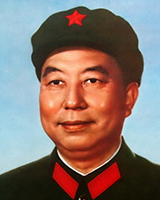 (Born: February 16, 1921; Died: August 20, 2008)
(Born: February 16, 1921; Died: August 20, 2008)
Mao’s hand-picked successor as top leader of the Party, government, and army. Hua organized and led the arrest and sentencing of the Gang of Four, ushering in the end of the Cultural Revolution. He insisted on following Mao’s policies and tried to block the rehabilitation of Party patriarchs purged by Mao, including Deng Xiaoping. But Deng won support from much more powerful allies, including Chen Yun, the Party’s longstanding economic guru, and Marshal Ye Jianying, the actual leader of the army since 1975. Compared to their rivals—veteran revolutionaries working with Mao—member of Hua’s camp lacked influence, experience, and sophistication. In 1980, under pressure from his opponents, Hua resigned his position as Premier. The next year, he lost his post atop the Party and the Army and, in the Party election of September 1982, he finally also lost his position on the Politburo.
Positions attained:
Premier (February 1976-September 1980)
Chairman of the Chinese Communist Party (CCP), Chairman of the Central Military Commission (October 1976-June 1981)
Member of the Politburo Standing Committee (August 1973-September 1982)
After demotion:
Though stripped of his positions in the Politburo, the government, and the Army, Hua was still selected as a member of the Party’s Central Committee in the Party election in 1982, a post he kept until 2002. Hua kept himself away from politics for the rest of his life.
References:
- “Hua Succeeds the Great Helmsman” [$], Time, October 18, 1976
- “Missing Leader” [$], Time, December 29, 1980
- “Hua Guofeng, Transitional Leader of China After Mao, Is Dead at 87,” The New York Times, August 20, 2008
- “Interview with Hua Guo-Feng” [Video], YouTube
Hu Yaobang — 胡耀邦
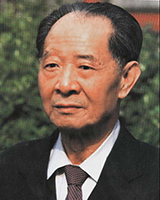 (Born: November 20, 1915; Died: April 15, 1989)
(Born: November 20, 1915; Died: April 15, 1989)
Deng Xiaoping’s right-hand man when Deng was restored to power, Hu Yaobang helped launch Deng’s reforms after Mao’s death. Hu was among the most open-minded and democratic of the top leaders in the Party. His tolerance of pro-democracy student movements in the 1980s inflamed the Party’s conservatives and elders, including Deng. In 1987, Deng forced Hu to resign. Widespread public mourning of Hu’s death in April 1989 led to an escalation of tensions between the Party and democracy protestors and the eventual outbreak of the Tiananmen Incident in June.
Positions attained:
Chairman/General Secretary of the CCP (June 1981-January 1987)
Member of the Politburo Standing Committee (February 1980-November 1987)
After demotion:
Hu was demoted to Politburo member.
References:
- “Leader of Party in China is Ousted for His ‘Mistakes’,” The New York Times, January 17, 1987
- “Beijing Party Directives Criticize Ousted Leader,” The New York Times, March 8, 1987
- “Hu Yaobang, 73, Dies in China; Led Communist Party in 1980’s,” The New York Times, April 15, 1989
- “Chinese Eulogy Bares Party Intrigue,” The Wall Street Journal, April 15, 2010
- “Tiananmen Redress Unlikely Despite Rare Tribute to Hu Yaobang” [Video], NTD Television, April 17, 2013
Zhao Ziyang — 赵紫阳
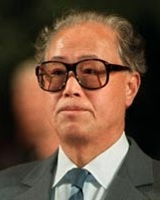 (Born: October 17, 1919; Died: January 17, 2005)
(Born: October 17, 1919; Died: January 17, 2005)
The principal leader of China’s economic reform in the 1980s, Zhao was promoted to the Party’s top post by Deng Xiaoping after the purge of Hu Yaobang. Zhao publicly expressed his opposition to the violent repression of the June 1989 student demonstration in Tiananmen Square. Deng swiftly removed him from power and he remained under house arrest until his death in 2005.
Positions attained:
Member of the Politburo Standing Committee (February 1980-June 1989)
General Secretary of the CCP (January 1987-June 1989)
No. 1 Deputy Chairman of the Central Military Commission (April 1988—June 1989)
After demotion:
Zhao lived for fifteen years under house arrest in Beijing.
References:
- “He Would Have Changed China,” The New York Review of Books, April 3, 2008
- “Man in the News; Urbane Guest from Peking,” The New York Times, January 10, 1984
- “China’s Dictators at Work: The Secret Story,” The New York Review of Books, July 2, 2009
- “China Makes Zhao Purge Formal, But He Still Gets to Be a Comrade,” The New York Times, July 1, 1989
- “Zhao Ziyang” [Speech, May 19, 1989] [Video], YouTube
- “Zhao Ziyang’s Secret Memoirs” [Video], CNN, May 15, 2009
Wang Dongxing — 汪东兴
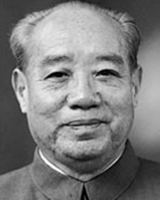 (Born: 1916)
(Born: 1916)
Mao’s bodyguard from 1947 until 1976 when Mao died, Wang was highly trusted by Mao and assigned deputy to Mao’s successor, Hua Guofeng. He deployed an elite security force to arrest the Gang of Four just twenty-seven days after Mao’s death. Wang helped Hua try to block Deng Xiaoping’s rehabilitation and was marginalized when Deng returned to power.
Positions attained:
Director of the General Office of the CCP Central Committee (November 1965-December 1978)
Member of the Politburo Standing Committee, Vice Chairman of the CCP (August 1977-February 1980)
After demotion:
Wang was demoted to Central Committee alternate in 1982. Between 1985 and 1992, he was a member of the Standing Committee of the Central Advisory Commission.
References:
- Xuezhi Guo, China’s Security State [Google Books], Cambridge University Press, 2012
Hu Qili — 胡启立
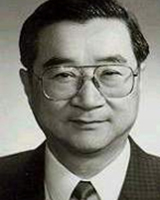 (Born: October 1929)
(Born: October 1929)
One of the most promising politicians of his day, Hu joined the Standing Committee of the Politburo in 1987 when he was only fifty-eight. Two years later, he sympathized with the student demonstrators on Tiananmen Square and was stripped of his Standing Committee membership after the crackdown on June 4.
Positions attained:
Member of the Central Secretariat (September 1982-June 1989)
Member of the Politburo Standing Committee (November 1987-June 1989)
After demotion:
Hu remained a member of the Central Committee after 1989. He was appointed Vice Minister of the Machine-Building and Electronics Industry in 1991, then Minister of the Electronics Industry in 1993. After he retired in 1998, Hu served as Vice Chairman of the Ninth Chinese People’s Political Consultative Conference (CPPCC). He is now the Chairman of the China Soong Ching Ling Foundation and the China Welfare Institute.
References:
- “3 Ousted Reformists Resurface in Minor Posts in Beijing,” Los Angeles Times, June 2, 1991
- “First CCP Newspaper Chief Editor Apologizes for June 4th” [Video], NTD Television [YouTube]
Zhou Yongkang — 周永康
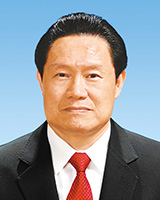 (Born: December, 1942)
(Born: December, 1942)
Zhou Yongkang was one of China’s most powerful political figures. He was Secretary of the Central Political and Law Committee from 2007 to 2012, controlling all of China’s law enforcement organs. It was widely believed that China’s budget for “Stability Maintenance” (or “wei wen” in Chinese) exceeded national defense spending during that period. Through his proxies, Zhou is also said to have controlled China’s most profitable state-monopolized sector: oil. After the political purges of Hu Yaobang in 1987 and Zhao Ziyang and Hu Qili following the Tiananmen crackdown in 1989, one of the Party’s unwritten rules to maintain internal stability was that no member of its Politburo Standing Committee would be purged or punished. The downfall of Zhou Yongkang, who was a member of the Politburo Standing Committee between 2007 and 2012, breaks this 25-year record. Some China observers believe that Zhou was a political rival of Xi Jinping and ally of the fallen Bo Xilai. Since December 2012 seven provincial and ministerial level officials, as well many more lower level officials and business people, have been pulled down because of their relationships with Zhou; members of Zhou’s family—including his older son, daughter-in-law, brother, wife, and other relatives—have been arrested or placed under investigation. On July 29, 2014, the Party announced that Zhou himself was under investigation for “serious disciplinary violations.” In its short announcement, the Party did not refer to Zhou as “comrade.” On December 5, China’s former security czar, Zhou Yongkang, was expelledfrom the Chinese Communist Party and formally arrested, after months of investigation.
On May 22, 2015, Zhou’s trial began in the northeast Chinese port of Tianjin. China’s official press did not report on it until the Tianjin No.1 Intermediate People’s Court sentenced him to life in prison on June 11. The court explained that it had decided not to open the trial to the public because it dealt with state secrets. Zhou was convicted of bribery, abuse of power, and intentional disclosure of state secrets.
Positions attained:
Minister of Public Security (December 2003-October 2007)
Secretary of the Central Politics and Law Commission of the CCP Central Committee (October 2007-November 2012)
Member of the Politburo Standing Committee (October 2007-November 2012)
After demotion:
Zhou Yongkang was expelled from the Party on December 5, 2014, and was sentenced a life imprisonment on June 11, 2015.
References:
- "Zhou Yongkang Arrested, Expelled from CPC," Xinhua, December, 6, 2014
- “How Xi Jinping Swatted Flies to Trip Biggest China Tiger,” Bloomberg, July 30, 2014
- “China Says Investigating Powerful Former Security Chief for Graft,” Reuters, July 29, 2014
- “China Puts Ex-Security Chief Zhou Yongkang Under Investigation,” The Wall Street Journal, July 29, 2014
Wu De — 吴德
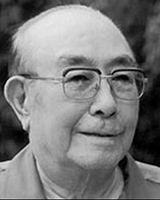 (Born: 1913; Died: November 29, 1995)
(Born: 1913; Died: November 29, 1995)
Promoted by Mao during the Cultural Revolution, Wu was a steadfast supporter of Hua Guofeng, Mao’s last hand-picked successor. Wu played an important role in the arrest of the Gang of Four and also was a staunch opponent of the rehabilitation of Deng Xiaoping. He stepped down with Hua and other Maoists when Deng was restored to power.
Positions attained:
No.1 Party Secretary of Beijing (May 1972-December 1978)
Member of Politburo (August 1973-February 1980)
Vice Chairman of the Standing Committee of the National People’s Congress (January 1975-April 1980)
After demotion:
In 1982, Wu was selected to join the Central Advisory Commission, an organization set up by Deng for the Party’s elders. Membership in the committee was honorary and a transitional arrangement toward formal retirement. Deng disbanded the commission in 1992.
References:
- Andrew Nathan, Chinese Democracy [Google Books], University of California Press, 1986
Chen Xilian — 陈锡联
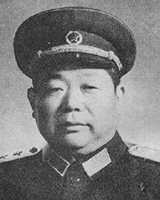 (Born: January 1915; Died: June 1999)
(Born: January 1915; Died: June 1999)
A veteran general of the People’s Liberation Army (PLA), Chen was a powerful figure in regional military affairs during the Cultural Revolution, first in Liaoning and then in Beijing. For a short period in 1976, Chen replaced Ye Jianying, the Marshal in charge of the PLA. Chen was widely believed to be close to Hua Guofeng and was purged when Hua lost his power in the late 1970s.
Positions attained:
Member of Politburo (April 1969-January 1980)
Vice Premier (January 1975-April 1980)
Commander of the Beijing Military Region (December 1973-January 1980)
After demotion:
Between 1982 and 1992, Chen was a member of the Standing Committee of the Central Advisory Commission. According to Party regulations, this position is nominally equivalent to membership in the Politburo.
References:
- “Peking Aide, Linked to Hua, Loses Key Military Post,” The New York Times, January 24, 1980
Ji Dengkui — 纪登奎
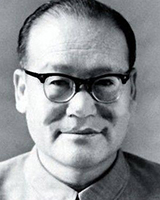 (Born: 1923; Died: 1988)
(Born: 1923; Died: 1988)
Trusted by Mao during the Cultural Revolution, Ji was promoted to one of the top positions in the Army in 1970 in order to balance out Lin Biao’s control, despite Ji’s lack of substantive military experience. Ji was close to Hua Guofeng and was marginalized in 1980 when Deng took power.
Positions attained:
Member of the Politburo (August 1973-February 1980)
Vice Premier (January 1975-April 1980)
After demotion:
In 1983, Ji became a researcher at the Rural Development Research Center of the State Council.
References:
- Roderick MacFarquhar and Michael Schoenhals, Mao’s Last Revolution [Google Books], Harvard University Press, 2006
Chen Yonggui — 陈永贵
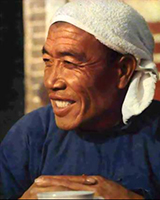 (Born: February 14, 1915; Died: March 26, 1986)
(Born: February 14, 1915; Died: March 26, 1986)
Born a tenant peasant, Chen was praised by Mao as a national model because of his active involvement in the collectivization campaign of the 1950s and his support for Mao’s radical politics. He was assigned to the position of Vice Premier in charge of agriculture in 1975, but lost his political clout when Mao died. In the Party election of September 1982, Chen lost his position on the Politburo and became an ordinary Party member.
Positions attained:
Vice Premier (January 1975-September 1980)
Member of Politburo (September 1973-September 1982)
After demotion:
Chen spent the rest of his life working as an agricultural advisor on the outskirts of Beijing.
References:
- “Chen Yonggui Dies in China; Peasant Who Rose to the Top,” The New York Times, March 27, 1986
Chen Xitong — 陈希同
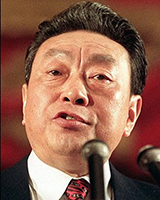 (Born: June 10, 1930; Died: June 2, 2013)
(Born: June 10, 1930; Died: June 2, 2013)
As the mayor of Beijing from 1983 to 1992, Chen was regarded by some China watchers as one of the people who persuaded Deng to deploy the Army to crack down on the Tiananmen demonstration on June 4. Chen denied this charge in his memoir and said he felt “sorry” for the massacre. He was the first Politburo member to be sentenced on charges of corruption and dereliction of duty in the post-Mao era. But many journalists and scholars believed that the actual reason for his downfall was his rivalry with Jiang Zemin, who was elevated from Shanghai Party Secretary to the General Secretary of the Party right after the crackdown in 1989. At the time, Chen was the core of the Party’s “Beijing Clique.”
Positions attained:
Party Secretary of Beijing (October 1992-April 1995)
Member of the Politburo (October 1992-September 1995)
After demotion:
In August 1997, Chen was expelled from the Party, which he had joined in December 1949. He served eight years in jail before being granted medical parole in 2006 due to poor health.
References:
- “China’s Power Struggle,” The New York Times, May 10, 1995
- “Tiananmen Crackdown Was a Tragedy, Says Former Beijing Mayor,” The Guardian, May 29, 2012
- “Chen Xitong, Beijing Mayor During Tiananmen Protests, Dies at 82,” The New York Times, June 5, 2013
Chen Liangyu — 陈良宇
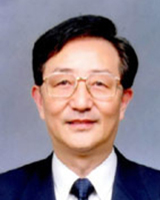 (Born: October 1, 1946)
(Born: October 1, 1946)
Spending nearly all of his political life in Shanghai, Chen was a prominent member of the powerful “Shanghai Clique” headed by Jiang Zemin. In 2006, Chen was charged with financial fraud, abuse of public funds, and accepting bribes, and sentenced to eighteen years in prison by the No. 2 Intermediate People’s Court, Tianjin. Media outlets, including The New York Times, reported that he once openly opposed the central government’s macro-economic control policy and challenged the authority of China’s then-top leaders, Hu Jintao and Wen Jiabao. His downfall upset the arrangement of China’s elite politics, especially in terms of the rival factions associated with Hu Jintao and Jiang Zemin. It also ushered in the abrupt rise of Xi Jinping, who succeeded Chen as Shanghai Party Secretary, and would become China’s new top leader.
Positions attained:
Party Secretary of Shanghai (October 2002-September 2006)
Member of the Politburo (November 2002-September 2006)
After demotion:
In July 2007, Chen was expelled from the Party, which he had joined in April 1980. He is now serving an eighteen-year sentence at Qincheng Prison in Beijing.
References:
- “Top China Leader Fired for Graft,” BBC, September 25, 2006
- “Beijing's Corruption Purge May Serve Political Ends,” Time, October 28, 2006
- “Former Party Boss in China Gets 18 Years,” The New York Times, April 12, 2008
Bo Xilai — 薄熙来
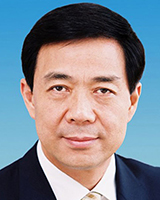 (Born: July 3, 1949)
(Born: July 3, 1949)
From Mayor of Dalian to Governor of Liaoning, from Minister of Commerce to Chongqing Party Secretary, Bo had had a perfect career path as a politician and a princeling before his downfall in March 2012. Contributing to his downfall, according to media including The Wall Street Journal and The New York Times, were his controversial Maoist campaigns in Chongqing, as well as his aggressive maneuvers to attain higher office. Bo was charged with bribery, abuse of power, and corruption. His five-day trial ended on August 26, 2013. On September 22, he was sentenced to life in prison.
Positions attained:
Party Secretary of Chongqing (December 2007-March 2012)
Member of the Politburo (October 2007-April 2012)
After demotion:
In September 2012, Bo was expelled from the Party, which he had joined in 1980. On September 22, Bo was found guilty of all charges of bribery, abuse of power, and corruption and sentenced to life in prison.
References:
- “In Rise and Fall of China’s Bo Xilai, an Arc of Ruthlessness,” The New York Times, May 6, 2012
- Times Topics: Bo Xilai, The New York Times
- “Post-Trial, Bo’s Star Still Shines With Chinese Base,” The Wall Street Journal, August 28, 2013
Xu Caihou — 徐才厚
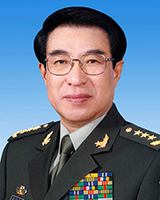 (Born: June 1943)
(Born: June 1943)
Xu spent his entire career in the People’s Liberation Army. He began as an ordinary solider stationed in Northeast China and rose to become the country’s second-most-senior military leader. On June 30, 2014, one day before the 93rd anniversary of its founding, the Chinese Communist Party expelled Xu from its ranks. He had been a member for 43 years. Some believe that he was a political ally of Bo Xilai and Zhou Yongkang, but in its announcement of his dismissal the Party charged him with corruption. Xu’s fall sets two precedents in contemporary China’s elite politics: First, no military leader at Xu’s exalted level has been toppled since before the rule of Deng Xiaoping; and second, unlike his peers, Xu was punished even after having retired from public office.
Positions attained:
Deputy Chairman of the Central Military Commission (October 2007-November 2012)
Member of the Politburo (October 2007-November 2012)
After demotion:
China's military porsecution department has taken over and is investigating Xu's case.
References:
- “China’s Antigraft Push Snares an Ex-General,” The New York Times, June 30, 2014
- “Top China Military Official Gen Xu Caihou Accused," BBC, June 30, 2014





















